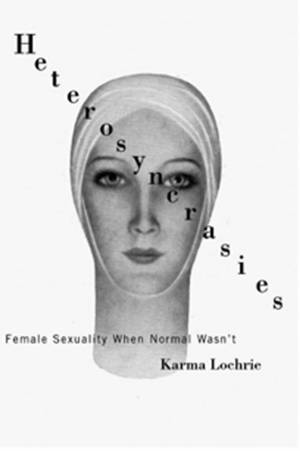
- Retrait gratuit dans votre magasin Club
- 7.000.000 titres dans notre catalogue
- Payer en toute sécurité
- Toujours un magasin près de chez vous
- Retrait gratuit dans votre magasin Club
- 7.000.0000 titres dans notre catalogue
- Payer en toute sécurité
- Toujours un magasin près de chez vous
34,45 €
+ 68 points
Description
In the early twentieth century, marriage manuals sought to link marital sex to the progress of civilization, searching for the history of what they considered to be normal sexuality. In Heterosyncrasies, Karma Lochrie looks to the foundation of modern society in the Middle Ages to undertake a profound questioning of the heterosexuality of that history. Lochrie begins this provocative rethinking of sexuality by dismantling the very idea of normal through a study of the development of statistics in the nineteenth century. She then intervenes in contemporary debates about queer versus ostensibly stable heterosexual social and sexual categories by exposing the "heterosyncratic" organization of sexuality in the Middle Ages and by clarifying the dubious contribution that the concept of normality has made to the construction of sexuality. In medieval texts from the letters of Heloise to Lollard heretical attacks on the Church, to Chaucer's Canterbury Tales, medical discourse surrounding the clitoris, and finally the Amazons of medieval myth, Lochrie focuses on female sexuality in the Middle Ages in an effort to discern a less binary, more diversified understanding of it. Lochrie demonstrates how the medieval categories of natural and unnatural were distinctly different from our modern categories of normal and abnormal. In her work we see how abandoning heteronormativity as a medieval organizer of sexualities profoundly changes the way we understand all sexualities - past, present, and possibly even future. Heterosyncrasies is a milestone in the study of sexual identity politics, revealing not only how presumptions of normality obscure our understanding of the past, but also how these beliefs affect our present-day laws, society, and daily life.
Spécifications
Parties prenantes
- Auteur(s) :
- Editeur:
Contenu
- Nombre de pages :
- 178
- Langue:
- Anglais
Caractéristiques
- EAN:
- 9780816645992
- Date de parution :
- 19-05-05
- Format:
- Livre broché
- Format numérique:
- Trade paperback (VS)
- Dimensions :
- 163 mm x 228 mm
- Poids :
- 281 g

Les avis
Nous publions uniquement les avis qui respectent les conditions requises. Consultez nos conditions pour les avis.






